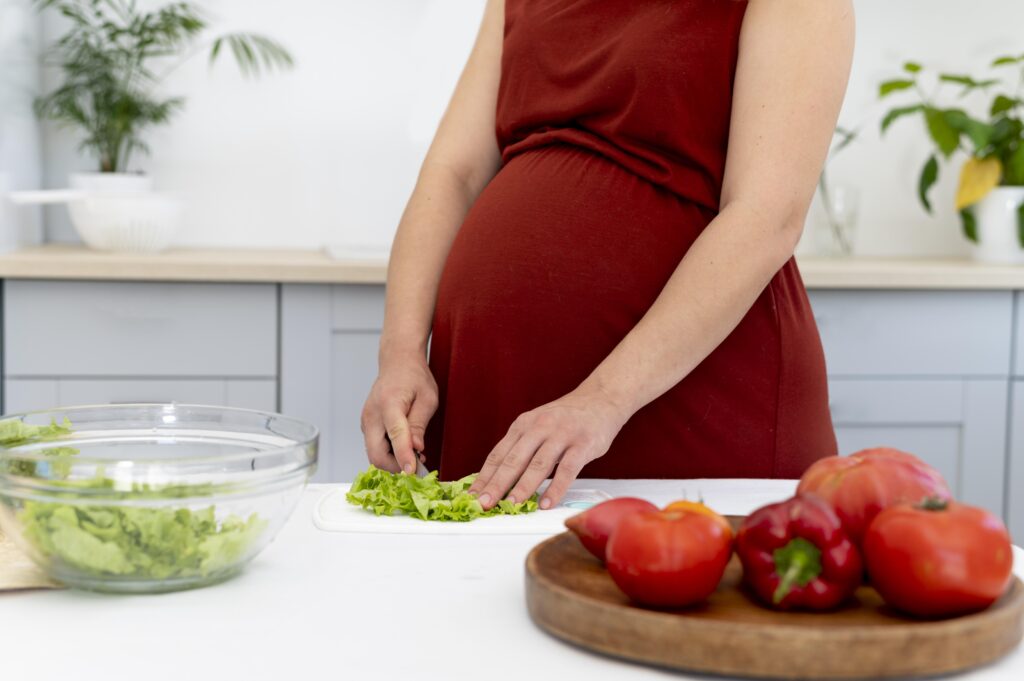Bringing new life into the world is an amazing journey that begins with nourishing your own body. Discover the transformative power of healthy diet during pregnancy as we explore how thoughtful nutrition can lay the foundation for your baby’s lifelong health and well-being. Maintaining a Healthy diet during pregnancy is crucial for both the well-being of the mother and the development of the baby. A balanced and nutritious diet provides essential nutrients that support the growth of the fetus and help prevent complications. Nourishing the Future: Essential Tips for a Healthy diet during pregnancy.

Here’s an in-depth guide to a healthy diet during pregnancy, along with examples of foods to include:
1. Folate and Folic Acid
Folate is a B-vitamin that’s crucial for preventing birth defects in the baby’s brain and spine. Folic acid, the synthetic form of folate, is often recommended as a supplement before and during pregnancy.
Examples of folate-rich foods:
- Dark leafy greens (spinach, kale, collard greens)
- Legumes (lentils, chickpeas, black beans)
- Citrus fruits (oranges, grapefruits)
- Avocado
- Fortified cereals
2. Calcium
Calcium is vital for the development of the baby’s bones and teeth, and it helps the mother’s body maintain her bone density.
Examples of calcium-rich foods:
- Dairy products (milk, yogurt, cheese)
- Fortified plant-based milk (soy, almond, coconut milk)
- Leafy greens (broccoli, kale, bok choy)
- Tofu
- Nuts and seeds (almonds, chia seeds)
3. Iron
Iron supports the increased blood volume during pregnancy and prevents anemia, which can lead to fatigue and complications.
Examples of iron-rich foods:
- Lean meats (chicken, turkey, beef)
- Fish (salmon, trout)
- Legumes (lentils, chickpeas, beans)
- Fortified cereals
- Dried fruits (raisins, apricots)
4. Protein
Protein is essential for the growth of the baby’s organs and tissues and helps the mother’s body cope with the increased demands of pregnancy.
Examples of protein-rich foods:
- Lean meats (poultry, lean cuts of beef)
- Fish
- Eggs
- Dairy products
- Legumes
- Nuts and seeds
5. Whole Grains
Whole grains provide complex carbohydrates, fiber, and essential nutrients that help regulate blood sugar levels and support digestion.
Examples of whole grains:
- Whole wheat bread and pasta
- Brown rice
- Quinoa
- Oats
- Barley
6. Healthy Fats
Healthy fats are important for brain development in the baby and help the mother absorb fat-soluble vitamins.
Examples of healthy fat sources:
- Avocado View on Amazon click here
- Nuts and seeds View on Amazon click here
- Fatty fish (salmon, sardines) View on Amazon click here
- Olive oil View on Amazon click here
- Coconut oil View on Amazon click here
7. Hydration
Staying well-hydrated is vital during pregnancy to support amniotic fluid, blood volume, and digestion.
Examples of hydrating fluids:
- Water
- Herbal teas (avoid those with caffeine)
- Coconut water
8. Avoid Certain Foods
During pregnancy, it’s important to avoid certain foods that could pose risks to the baby’s health, such as raw or undercooked meats, unpasteurized dairy products, certain fish with high mercury content, and raw or undercooked eggs.
9. Prenatal Supplements
In addition to a healthy diet, your healthcare provider might recommend prenatal supplements containing folic acid, iron, calcium, and other essential nutrients.
10. Caloric Intake
While it’s important to consume more calories during pregnancy, the increase doesn’t need to be drastic. In the first trimester, you might not need any additional calories, but in the second and third trimesters, an extra 300–500 calories per day is generally recommended. To make sure you are reaching your nutritional needs, concentrate on nutrient-dense meals.
11. Variety and Balance
To ensure you’re receiving a healthy diet during pregnancy, aim for a varied array of meals. A balanced plate should include: Fluids: Staying hydrated is crucial. Water is the best choice, but herbal teas and coconut water can also contribute to your fluid intake. Protein is Essential for a baby’s growth and development. It includes lean meats, fish, eggs, dairy products, legumes, and nuts. Carbohydrates: Choose whole grains for sustained energy, fiber, and essential nutrients.
Vegetables: A variety of colorful vegetables provide vitamins, minerals, and antioxidants.
Fruits are natural sources of vitamins, fiber, and hydration.
Dairy or Dairy Alternatives: For calcium and vitamin D
Healthy fats are essential for brain development.
12. Managing Morning Sickness
During the first trimester, morning sickness can make it challenging to maintain a balanced diet. Try eating small, frequent meals and opting for bland, easy-to-digest foods like crackers, plain yogurt, and ginger tea. Consult your healthcare provider if morning sickness is severe or causing excessive weight loss.
13. Nutrient-Rich Snacking
Healthy snacks can help stabilize blood sugar levels and provide sustained energy throughout the day. Opt for options like yogurt with berries, a handful of nuts, carrot sticks with hummus, or whole grain crackers with cheese.
14. Food Safety
Practice proper food hygiene by washing fruits and vegetables thoroughly, cooking meat thoroughly, and avoiding cross-contamination.
15. Gestational Diabetes
Some women develop gestational diabetes during pregnancy. If you’re at risk, your healthcare provider might recommend monitoring your blood sugar levels and adjusting your diet accordingly.
check out here Indian Spices
In conclusion, maintaining a healthy diet during pregnancy is not only beneficial for the expectant mother’s well-being but also plays a crucial role in the optimal development and growth of the baby. A balanced and nutritious diet rich in essential nutrients like folate, calcium, iron, protein, healthy fats, and whole grains is fundamental to supporting the changing demands of pregnancy. By incorporating a variety of nutrient-dense foods, staying hydrated, and avoiding potentially harmful substances, pregnant women can create an environment that fosters the health and vitality of both themselves and their unborn child.
Ensuring a healthy diet during pregnancy is paramount for optimal maternal and fetal health. From nutrient-rich foods to hydration, discover how a well-balanced diet during pregnancy can promote positive outcomes and support the development of a growing baby.
However, it’s important to recognize that each pregnancy is unique, and individual nutritional needs may vary. Consulting with a healthcare provider or a registered dietitian is highly recommended to receive personalized guidance and ensure that dietary choices align with specific health requirements and considerations. By nurturing a well-rounded diet and making informed choices, women can embark on this transformative journey with confidence, knowing that they are providing the best possible foundation for their own health and the future of their precious little one.
FAQs: Healthy diet during pregnancy
1. What are the key nutrients I should focus on during pregnancy?
- Answer: Key nutrients include folic acid, iron, calcium, protein, and omega-3 fatty acids. These nutrients support your baby’s development and help maintain your health.
2. How much weight should I expect to gain during pregnancy?
- Answer: Weight gain varies based on your pre-pregnancy weight. On average, a healthy weight gain ranges from 25 to 35 pounds. Your healthcare provider can give you personalized guidance.
3. Can I continue to eat seafood during pregnancy?
- Answer: Yes, but choose low-mercury options like salmon, sardines, and trout. Limit high-mercury fish like swordfish, king mackerel, and tilefish.
4. Are there foods I should avoid while pregnant?
- Answer: Yes, avoid raw or undercooked seafood, eggs, and meat. Also, steer clear of unpasteurized dairy products, deli meats, and high-mercury fish.
5. How much water should I drink each day?
- Answer: Aim for at least 8-10 cups (64-80 ounces) of water daily. Staying hydrated is crucial for both you and your baby.
6. Is it safe to drink caffeine during pregnancy?
- Answer: Moderate caffeine intake is generally considered safe. Limit your intake to about 200 mg per day, which is roughly one 12-ounce cup of coffee.
7. What can I do to manage morning sickness?
- Answer: Eat small, frequent meals throughout the day, and avoid foods and smells that trigger nausea. Ginger tea or ginger candies can also help alleviate symptoms.
8. Can I follow a vegetarian or vegan diet while pregnant?
- Answer: Yes, but ensure you get enough protein, iron, calcium, vitamin B12, and other essential nutrients. Consider consulting a healthcare provider or nutritionist for personalized advice.
9. How important is folic acid, and where can I find it?
- Answer: Folic acid is crucial for preventing neural tube defects. It’s found in leafy greens, citrus fruits, beans, and fortified cereals. Supplements are also recommended.
10. Can I eat for two?
- Answer: You don’t need to eat twice as much. Focus on nutrient-dense foods rather than increasing calorie intake significantly. In the second and third trimesters, you only need about 300-450 extra calories per day.
11. Are prenatal vitamins necessary?
- Answer: Prenatal vitamins are highly recommended to ensure you and your baby get essential nutrients like folic acid, iron, and calcium, which may be difficult to obtain from diet alone.
12. How can I ensure I’m getting enough iron?
- Answer: Include iron-rich foods like lean meats, leafy greens, beans, and fortified cereals in your diet. Pair these with vitamin C-rich foods to enhance absorption.
13. Is it safe to eat artificial sweeteners?
- Answer: Some artificial sweeteners are considered safe, but it’s best to limit their intake. Opt for natural sweeteners like honey or maple syrup in moderation.
14. What snacks are healthy during pregnancy?
- Answer: Healthy snacks include fresh fruits, nuts, yogurt, whole-grain crackers, and vegetable sticks with hummus. These provide essential nutrients and help keep your energy levels stable.
15. How can I maintain a balanced diet with food aversions and cravings?
- Answer: Listen to your body and try to incorporate a variety of healthy foods. If certain foods are unappealing, find alternatives that provide similar nutrients. Moderation is key for cravings.
These FAQs should help address common concerns and provide valuable guidance for maintaining a healthy diet during pregnancy.
